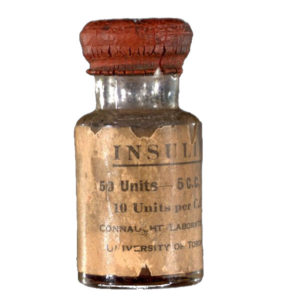
Insulin is certainly a star among the hormones involved in human metabolism. Indeed, before the discovery of this remarkable hormone made by Banting, Best, Macleod and Collip in 1921, the deficit in insulin production of patients living with type 1 diabetes had devastating consequences on their quality of life and they would tragically die at a young age. When these scientists yielded their patent to the University of Toronto to allow the mass production of insulin—which is referred to as “Canada’s gift to the world”–, it led to life-saving therapy for people suffering from diabetes. Later, it was found that many patients with diabetes were resistant to the action of insulin, leading to the identification of another form of this disease: type 2 diabetes. A large body of scientific evidence has now shown that insulin resistance, even in the absence of type 2 diabetes, has numerous health consequences including being a powerful risk factor for cardiovascular disease.
As this year marks the 100th anniversary of this outstanding breakthrough, the International Chair on Cardiometabolic Risk wants to pay humble tribute to the remarkable contribution of these four scientists whose work has contributed to saving millions of lives all over the world.
In 2021, with the COVID-19 pandemic still not resolved, we hope that the celebrations around the 100th anniversary of this discovery will inspire scientists throughout the world who also need to show ingenuity and solidarity not only to develop life-saving therapies and vaccines, but also to leave a better, healthier world to future generations.
Many initiatives are planned worldwide to celebrate this event. Review papers and videos salute this revolutionary Canadian discovery. A non-exhaustive list is provided below.
Websites and videos:
- University of Toronto: Celebrating a Century of Health Innovation at the University of Toronto
- Diabetes Action Canada: 100 Years of Insulin: Celebrating its impact on our lives – RECORDINGS
- Cardiometabolic Health, Diabetes and Obesity Research Network (CMDO): 100th Anniversary of Insulin Discovery
- International Diabetes Federation: Centenary of Insulin Campaign
- Endocrine Society: Celebrating 100 Years of Insulin
Review papers:
- Lewis GF, Brubaker PL. The discovery of insulin revisited: lessons for the modern era. J Clin Invest 2021, 131(1):e142239.
- Fralick M, Zinman B. The discovery of insulin in Toronto: beginning a 100 year journey of research and clinical achievement. Diabetologia 2021, 64(5):947-953.